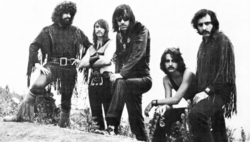Steppenwolf (band)
| Steppenwolf | |
|---|---|

Steppenwolf in 1970 (L-R: Goldy McJohn, Jerry Edmonton, John Kay, Larry Byrom,Rick Harason)
|
|
| Background information | |
| Origin | Toronto, Ontario, Canada |
| Genres | |
| Years active |
|
| Labels | |
| Associated acts | |
| Website | steppenwolf |
| Members |
|
Steppenwolf is a Canadian-American rock band that was prominent from 1968 to 1972. The group was formed in late 1967 in Toronto by lead singer John Kay, keyboardist Goldy McJohn, and drummer Jerry Edmonton. Guitarist Michael Monarch and bass guitarist Rushton Moreve were recruited by notices placed in Los Angeles-area record and musical instrument stores. The essential core of Steppenwolf was John Kay, Jerry Edmonton, and Goldy McJohn from The Sparrows (originally Jack London & The Sparrows from Oshawa, Ontario, Canada).
Steppenwolf sold over 25 million records worldwide, releasing eight gold albums and 12 Billboard Hot 100 singles, of which six were top 40 hits, including three top 10 successes: "Born to Be Wild", written by Dennis Edmonton (using the stage name Mars Bonfire), "Magic Carpet Ride", and "Rock Me." Steppenwolf enjoyed worldwide success from 1968 to 1972, but clashing personalities led to the end of the core lineup. Today, John Kay is the only original member, having served as the lead singer since 1967.
The name change from The Sparrows (The Sparrow) to Steppenwolf was suggested to John Kay by Gabriel Mekler, being inspired by Hermann Hesse's novel of the same name. Steppenwolf's first two singles were "A Girl I Knew" and "Sookie Sookie". The band finally rocketed to worldwide fame after their third single, "Born to Be Wild", was released in 1968, as well as their version of Hoyt Axton's "The Pusher". Both of these tunes were used prominently in the 1969 counterculture cult film Easy Rider (both titles originally had been released on the band's debut album). In the movie, "The Pusher" accompanies a drug deal, and Peter Fonda stuffing dollar bills into his Stars and Stripes-clad fuel tank, after which "Born to Be Wild" is heard in the opening credits, with Fonda and Dennis Hopper riding their Harley choppers through the America of the late 1960s. The song, which has been closely associated with motorcycles ever since, introduced to rock lyrics the signature term "heavy metal" (though not about a kind of music, but about a motorcycle: "I like smoke and lightning, heavy metal thunder, racin' with the wind..."). Written by Sparrow guitarist Dennis Edmonton, who had begun using the pen name Mars Bonfire and inspired by a billboard roadside advertisement Bonfire liked which depicted a motorcycle tearing through the billboard artwork, the song had already reached number two on the Billboard Hot 100 in August 1968. It sold over one million copies, and was awarded a gold disc.
...
Wikipedia
